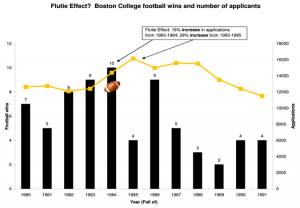How you ever thought about how college and universities recruit teenagers to apply to their school? From nonstop mail to college fairs, teams deploy several different strategies to increase the number of applications and diversify the pool in which potential students are selected. However, there is another way in which universities both influence seniors to apply and also boost their own reputation. It is never primarily thought as a recruiting technique, but collegiate athletics are a huge calling card for student prospects. Colleges will always exploit successful athletic programs to increase how many people are interested in their schools. And the best part is that their marketing team kills two birds with one stone. Reports show that with the aid of prosperous sports team, applications will tend to rise.This is seen in how application rates surged 20% at Northwestern University after the football team won the Big Ten Championship.But what students are being lured by these big name teams?According to data, students with below average SAT scores will opt for colleges that are often synonymous with athletics. However, on the other hand, (as you would expect) students with above average standardized scores will pursue those universities who are known for academics. However, students of all test score ranges are still affected by a school’s academic success. The question this raises for me is, is it all worth it?
This response to success on the playing field is often dubbed as the “Flutie Effect”. Named after Boston College’s quarterback Doug Flutie who beat the University of Miami in 1984 with a last second “Hail Mary” in an intense game. Boston College saw their applications flowing in increase by a staggering 30% in just two years. I will be honest, this effect influenced me in my decision as college application season began. You spend four years at the same place, you have to enjoy it to some extent right? Academics are always first, but what priority should athletics be placed at? To some, unfortunately, it is placed too high. Reports show that as premier collegiate programs reach certain achievements, the respective students of those universities begin to see deteriorated work ethic. At the University of Oregon, every time the basketball team won three games in a row, male students’ GPA saw a drop of 0.02. The Duck’s accomplishments also warranted more drinking, partying, and studying less. So, again I ask, is choosing a school for their athletics really a wise decision? Once you pay your first tuition bill, you are not only inherited a great sports program, but an unseen danger that lies within it. That being the peer pressure to celebrate a team’s success, just as if you yourself were a player on the team. It is even clearly evident here at PennState. With the football team’s unforeseeable Big Ten Championship victory and historic season, everyone had a reason to celebrate. But at what cost? Many students left to watch the game, but assignments on hold to riot in the streets, and drank until they did not even remember the game. Believe me, you could have me found in the streets that night chanting with the rest of you, but this could be a potential problem. Not just because sports culture is dominating academics on campus, but because universities are picking up on this notion, and exploiting it.
Data shows that for colleges to see the same boost in applications that they receive from athletic success, they would need to decrease tuition by 3.8%. That or recruit superior professors and officials to better the academics in the school. Instead, the colleges seem to be taking Option A, by trying to bring fame to their sports programs. Students are becoming the second priority to make way for a lucrative advertising scheme. Colleges with Division 1 athletics spend, on average, about $13,628 on regular students. This is compared to the average of $91,936 spend on athletes. Academics are now being thought of as inferior to the business that is college sports. You can not blame though, as it is an incredible marketing approach. Success is never a bad thing. Application rates skyrocket, money rolls in, and everyone is happier. No one knows this better than PennState as of late. But it is becoming of increased concern that too many prospective students are too focused on what a college’s sports over, rather than their educational value. I am not trying to undermine any of what collegiate sports do (I myself am a huge fan), but academics should never take the backseat.


